Apple's iPad - The AnandTech Review
by Anand Lal Shimpi, Brian Klug & Vivek Gowri on April 7, 2010 9:39 PM EST- Posted in
- Smartphones
- Mac
- Apple
- iPad
- Mobile
Gaming on the iPad
The majority of premiere launch titles for the iPad were gaming focused. Partly because this shows off the device's additional processing power with the A4, but also because the majority are only marginally different from the iPhone version, instead offering native resolution.
First is N.O.V.A. HD, an FPS title that is largely unchanged from the iPhone version except for supporting higher resolution. It runs virtually flawlessly on the platform, despite the larger resolution. The only major annoyance here is that the title doesn't appear to work with any landscape orientation you choose, and Apple's iPad/Case accessory chose the complete opposite landscape view by default.
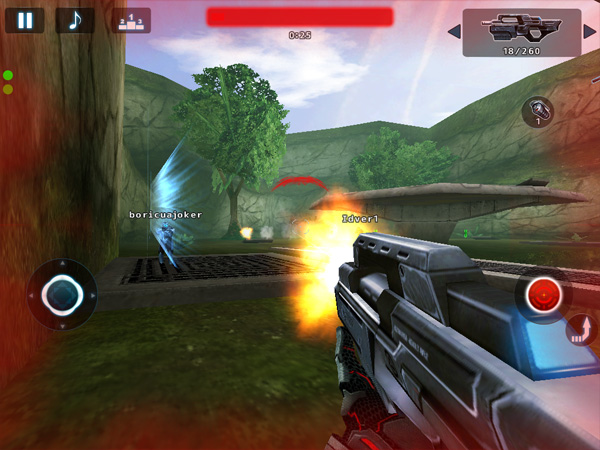
It's insanely hard to take action screenshots, I discovered
The title performs flawlessly performance wise, though playing an FPS title with look, movement, and fire controls all fighting for your two hands and 10 fingers is still challenging.
Next is Flight Control HD, which continues to do what the original title did well.
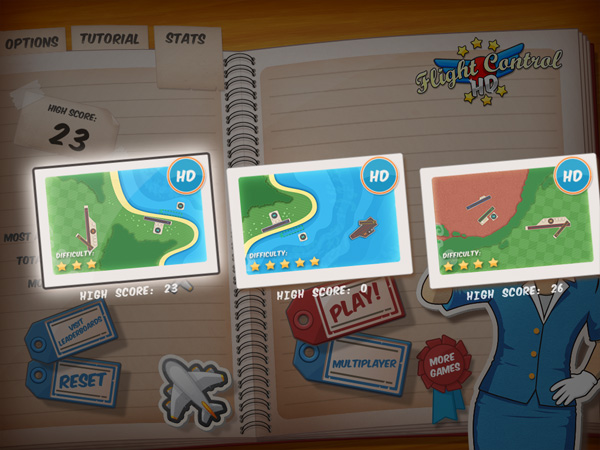
Bigger maps are "HD" - Old maps still linger around too
Namely, cast the player as an air traffic controller managing exponentially busier and busier airspace in a 2D world. It's the same that we've seen before, just bigger, more complicated, and scaled up. It's a high profile game for sure, but the approach is safe. While it'd be pointless to destroy what made the game good, there just isn't anything new that the iPad's form factor contributes other than a bigger screen.
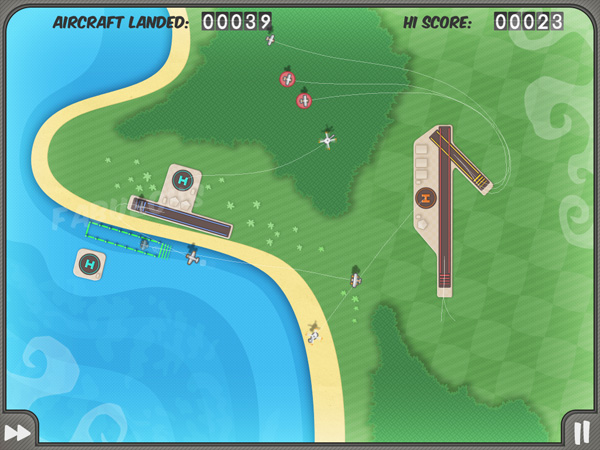
It's easier on the bigger screen, until it throws even more at you
There's also Real Racing HD, which looks very high resolution on the platform, though it too is ultimately dependent on a control scheme that's at times difficult. Rotating the screen to drive makes an otherwise pretty normal arcade style racing game surprisingly difficult. There are plenty of driving assists, including automatic braking, and these ultimately save the game from being too complicated to play easily.
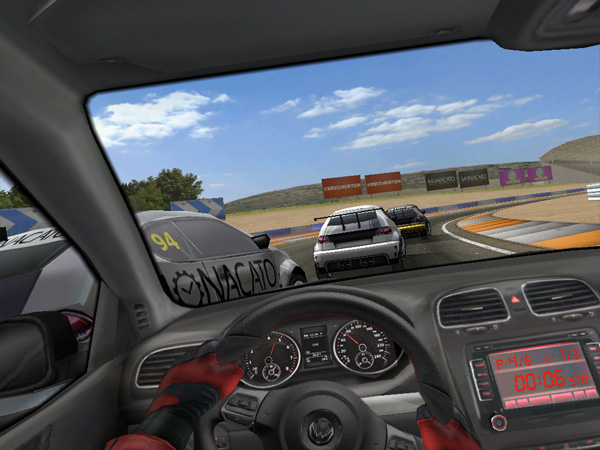
Tilt to drive - that's for steering and gas
Worms has long been ported to the iPhone platform, and although its control scheme is initially challenging, it's probably the one that best leverages the iPad. I found the title difficult for the first few plays, and it's got a steep control learning curve, but execution is fun and engaging. The title also looks very crisp on the iPad, though there was the occasional framerate stutter.
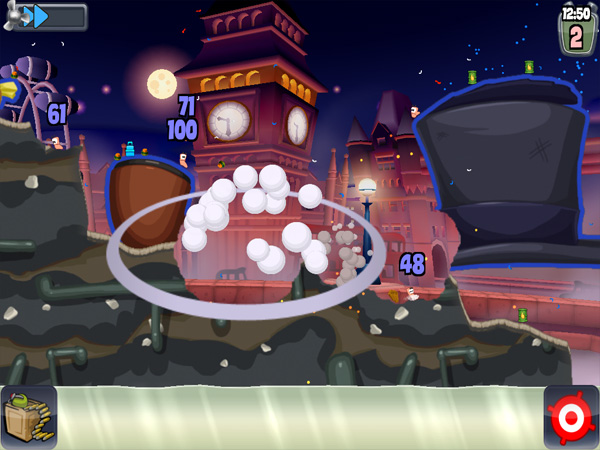
The holy hand grenade remains my weapon of choice
Probably next on the list of engaging titles that offer unique control schemes is Command and Conquer: Red Alert. The iPad's display is finally large enough to really allow developers to make titles that are rich and immerse, and not mere novelties. The game still has a bit of roughness around the edges - sounds are sometimes a bit low fidelity for my taste, and there's a lot of speech events that are very very redundant. But the title is strong when it comes to user interaction.
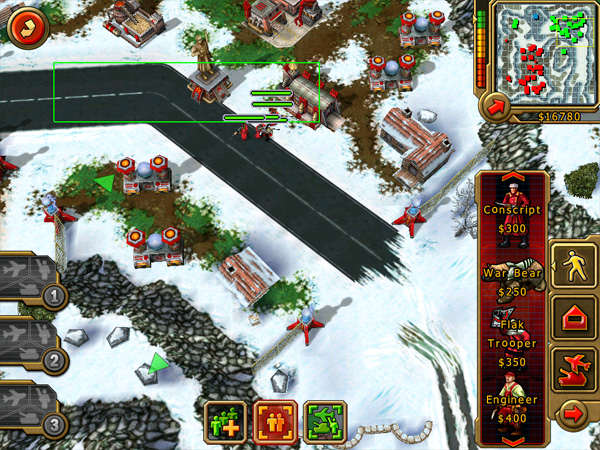
That selection box was made with multitouch
For example, selecting a group of users can be accomplished by either clicking a box, and then dragging a selection (this is a mouse convention), or by using a multitouch gesture (Yes! Finally!). Three points define a selection square, and units within the square are automatically selected. It's a gesture that's natural, super fast, and the exact kind of new use scenario I want to see more of on the platform. Developers need to re-think every bit of preconceived interaction notions from the desktop. Erase of all of it.

If you sucked at RTS, you'll still suck at iPad RTS
Is the iPad a gaming platform? Definitely. Even if you argue that it isn't a fully fledged, integrated one, iPhone games remain the platform's top grossing commodity. The iPad's larger screen and increased processing power will only further amplify that trend, but only if developers can create compelling UI leveraging the iPad's multitouch screen and lack of hardware buttons. Some titles are going to be challenging to pull off, others lend themselves entirely.










108 Comments
View All Comments
solipsism - Thursday, April 8, 2010 - link
I also thought the Moorestown recommendation was odd, especially when the next page was about the phenomenal battery life. If he made a more detailed case for it perhaps he'd have a point, but the simple "because it's faster" stance is lacking.Anand Lal Shimpi - Thursday, April 8, 2010 - link
Initial power specs for Moorestown appear to be fairly competitive with ARM based SoCs. Remember this is Moorestown, and not Pineview. The two chips are very different.Realistically I don't think it would be Moorestown, but the 32nm follow-on starts to make a lot of sense.
Take care,
Anand
metafor - Thursday, April 8, 2010 - link
Just curious, what are the initial power numbers for Moorestown anyway? Keep in mind that with the change in bus architecture and the use of LP DRAM, performance will be significantly slower in some cases than current netbooks. Also, would it really compare to an A9-class SoC?IntelUser2000 - Friday, April 9, 2010 - link
I have a feeling Apple didn't go Moorestown for two primary reasons.1) Timeframe
2) Cost
Moorestown should be announced shortly, but the devices based on it won't be available until Q3 of this year. That's 6+ months from when the iPad is going to release. And although Intel might achieve both better performance and comparable power usage, but the sacrifice there will be higher cost. Fully integrated SoC like the A4 costs significantly less.
Performance should be quite good. There's a 600MHz version for smartphones that can use Burst Mode to 1.2GHz, and a MID oriented version that probably clocks at 1.3GHz base and does 1.9GHz burst. It's supposed to feature "Bus Turbo" as well.
If they also do a full integrated memory controller unlike Pineview we have a good chance it'll be clock per clock faster than Netbook Atoms. Earlier on Intel claimed "30%" boost over previous platform but clock speeds weren't mentioned.
metafor - Friday, April 9, 2010 - link
Moorestown will be a fully interated SoC. It'll have LP DDR1 and LP DDR2 memory controllers as well as a GPU, the Atom CPU and various peripheral connectivity. It's comparable to the A4 in terms of features although I really would not write it off as "comparable" in terms of power until some data is published.ekul - Thursday, April 8, 2010 - link
I'd agree the successor to moorestown is more promising. Are there even any shipping products based on moorestown yet? I don't think apple is going to take a gamble on an untested platform.I'm genuinely looking forward to seeing performance numbers for cortex a9, especially since there will be real dual core mobile variants, not just hyperthreading. A technique like what MS is planning for IE9, rendering a website on one core and compiling javascript on another, would help bridge the perormance gap along with the higher clocks.
michal1980 - Wednesday, April 7, 2010 - link
really this is easier then a laptop/notebook?A notebook by its vary nature I can rest on my lap or a table and adjust its screen. To watch a movie I dont have to hold the thing up.
To type, I dont have to bend to werid angles to hold the device up, etc etc.
IMHO, it seems like alot of the experance is attributed to the newness of the device vs its actual usage. I'm wonder how this newness will wear.
manicfreak - Thursday, April 8, 2010 - link
Can't you do all of those aforementioned things on an ipod touch/iphone? There are already home automation apps for the iphone right now.What can the iPad do that the iphone/ipod touch can't? Beside having a bigger screen and longer battery life?
And for such a big device, the performance should be closer to an atom instead of a snapdragon.
If something doesn't fit in my pocket, then I would rather bring a light-weight CULV laptop with me... with touchscreen if one wishes (i.e. Acer Timeline 1820T) or a hybrid notebook-tablet (Lenovo IdeaPad U1).
jasperjones - Thursday, April 8, 2010 - link
"there are some things the iPad does much better than anything you might own today. Web browsing, photo viewing, reading email, any passive usage scenarios where you're primarily clicking on things and getting feedback, the iPad excels at."What exactly makes it better at those tasks? It's not that I disagree but, in my opinion, you didn't drive this point home. I don't understand why you think it's better. And yes, I read the whole article.
solipsism - Thursday, April 8, 2010 - link
I don't think anything anyone can write can convince you. Many aspects just feel more natural to use. That isn't to say it's perfect everywhere but I think that as a casual mobile consumption device it's much better than a notebook, and much better than a netbook.